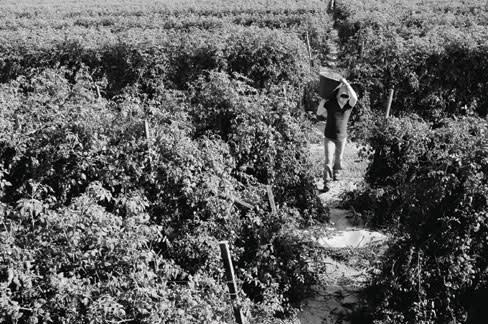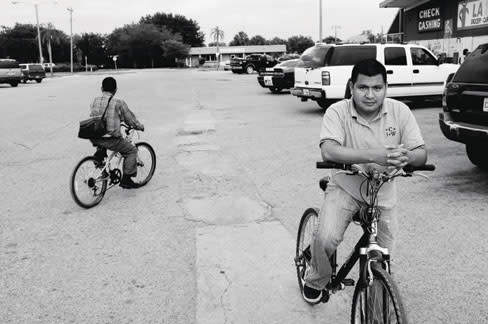A Sarasota Organization Brings Hope and Justice to Florida's Tomato Fields

Ten years ago, at the age of 22, Julia de la Cruz left her home and family in the mountains of Guerrero, one of Mexico’s poorest states. She hoped to make enough money working in the tomato fields of Southwest Florida to continue her studies and perhaps one day become a doctor. Instead she found herself trapped in a world of poverty and fear, where swaggering bosses bullied and abused the workers they employed.
“I’ve seen crew leaders keep workers’ paychecks. There was a lot of robbery,” she says. Some beat the workers and a few even held them captive. Women, especially, suffered at the hands of the leaders, who would harass them and sometimes demand sexual favors in exchange for giving them easier jobs.
“You see a lot of things you don’t like,” says de la Cruz, recalling working at a hothouse where she often had to put in 16-hour days seven days a week. At night, she’d fall asleep, exhausted, in a metal trailer filled with bunk beds holding other men and women.
The farm was in a remote area, miles away from the nearest small town. There was no way to leave. “And when you’re out in the middle of nowhere,” she says, “who would know if you were robbed or raped? Who would know?”
From Homestead to Immokalee to the Georgia border, in fields where some 50 million pounds of tomatoes, 80 percent of the entire crop in the United States, are harvested every year, migrant laborers have come and gone for 50 years like ghosts, unnoticed by those who eat the food they grow and often abused by their bosses while most growers turned a blind eye. But soon after she arrived, de la Cruz joined a group of Immokalee migrants, called the Coalition of Immokalee Workers (CIW), becoming part of a 20-year-long David-and-Goliath battle pitting impoverished, mostly uneducated migrants against some of the world’s mightiest corporations.
Thanks to that battle, those brutal practices are changing. Today a new nonprofit organization, the Fair Food Standards Council (FFSC), is implementing reforms and monitoring tomato grower-worker relations throughout Florida.
Based in a small corner office in downtown Sarasota, the FFSC was set up in November 2011 as an independent entity whose purpose is to monitor and implement the Fair Foods Program (FFP) CIW fought to establish. With farms located all through the state, the organization chose Sarasota as an ideal central location for its headquarters.
The FFP brings workers, growers and corporate buyers together to improve wages and conditions in the tomato fields.
One of the most important changes is a penny-per-pound pay bonus for field workers. Other changes include a 24-hour hotline for workers’ complaints and a zero-tolerance policy for child labor, forced labor, sexual assault and violence.
The FFP performs thorough yearly audits of field workers and farms, and follows through on complaints to make sure growers are complying with Fair Food Program’s Code of Conduct. The code, designed by the workers themselves, ensures basic human rights are protected in the fields and includes such practices as direct hiring of workers by the growers instead of labor contractors, installing timekeeping systems that put workers in control of clocking in and out, following standards for measuring every bucket workers pick, offering shade areas for rest and brief 10- or 15-minute rest breaks once or twice a day, among other benefits.
The extra penny per pound of tomatoes is paid by corporate buyers, among them Aramark, McDonald’s, Yum! Brands, Wal-Mart and Subway, who are members of the FFP. That increase goes directly to the workers and is listed separately in their paychecks. In the three seasons since the program began, more than $14 million from the penny per pound increase was paid to workers; and as more companies join the program, the payments will undoubtedly increase.

The story of how a small group of migrant laborers managed to convince powerful corporations to treat them decently and pay more for their labor is as dramatic and stirring as a movie—which it now is. Food Chains, which was produced by Eva Longoria, was released in February and has been featured at the Tribeca and Berlin film festivals.
It all began in Immokalee, a small farming community 35 miles southwest of Fort Myers, where nearly half the population lives below the poverty line. The tomato picking season in Florida runs from late October to late May. For those seven months, Immokalee and other towns near the tomato fields, such as Palmetto and Ruskin, are flooded with migrant workers. Drive through the streets of Immokalee and you may feel like you’ve left the United States. Signs advertise goods in Spanish and Creole. Haitians walk the streets carrying goods on their heads, and chickens and roosters run loose around rows of housing where laundry hangs to dry. The housing for the workers is dismal—and expensive. Because most migrant workers don’t have cars, they need to stay close to downtown where the buses come to pick them up and take them to the fields. Up to a dozen migrants will pile into a one- or two-bedroom shack or trailer, many without air conditioning, where rent is more than $1,000 a month.
In 1993, Lucas Benitez, 37, and a few other migrant workers began talking about the abuses they were suffering at the hands of crew leaders and decided to found the Coalition of Immokalee Workers. Soon the CIW was holding regular meetings, and more workers kept joining.
Benitez is a serious but soft-spoken man who left his home in rural Guerrero at 16 to join family members in the U.S. and work in the fields of Immokalee.
“Immokalee was a desert of justice,” he says, adding that back then it was useless to complain. Workers lived in fear of retribution; anyone who protested after a beating or even a rape by the crew leaders, who employed them, would be likely to lose his or her job. And even those who dared to step forth found their voices ignored. “If a crew leader beat up a worker and we complained to the Legal Aid, the crew leader would get fined $500, but nothing would change,” Benitez says.
Crew leaders—working as independent contractors—hired the workers and drove them to the fields to work. The growers paid the crew leader and he paid the workers. Or not. “If you didn’t get paid for two or three days,” Benitez says, “you didn’t bother complaining because then the crew leader wouldn’t hire you again.”
Cruz Salucio, a 30-year-old Guatemalan immigrant who came to Immokalee in 2005, says newcomers were especially likely to be abused. “There are always new people coming here. And when you don’t know, you stay quiet,” he says. “Nobody took time; the hours were not respected.” In his first weeks after arriving in town, the crew leader he had worked for disappeared without paying him for a week’s work.
Before the FFP took effect, workers—mostly Mexican, Guatemalan and Haitian immigrants—gathered before dawn at the parking lot outside the Fiesta Market in downtown Immokalee, where crew leaders picked them up and drove them to the fields hours away. Families with small children would have to wake them in the predawn hours and take them to a neighbor—if they could find an available one—leave them alone, or take them to the field. The buses were not regulated, and many were unsafe and uninsured. When the workers arrived in the fields, the crew leaders logged in the time by hand. Often, workers had to wait for the dew-soaked tomato plants to dry in the sun before they could start picking. On some days, they might leave the pick-up spot at 5 a.m. and arrive in the fields by 7 a.m. but not begin picking until 10 a.m. They never got paid for that time.
But those were only some of the abuses they suffered.
“Back then Immokalee was ground zero for human trafficking,” former judge Laura Safer Espinoza, executive director of the Fair Food Standards Council, says. Safer Espinoza, a petite woman with an intense stare that tells of her years as a New York Supreme Court judge, manages nine auditors who go out in the tomato fields interviewing workers, auditing payroll records, including the penny per pound payments, and monitoring the Fair Food Program’s 24-hour complaint hotline.
Slavery in Immokalee and other remote agricultural areas in Florida has been frequently documented. In 1999, three men who had been held against their will and forced to work in the fields and live in a camp near Immokalee escaped and told their story to the CIW. The CIW alerted federal authorities, who raided the camp. In 2000, the employers of the workers pled guilty to slavery charges.
The following year Benitez himself was involved in the rescue of three workers who were being held captive in Lake Placid, Fla. The contractors who had hired the men are now serving 34 years in jail for slave trafficking.
As recently as 2008, a crew leader named Cesar Navarrete and his brother, Geovanni, were sentenced to serve 12 years in a federal prison for holding and denying pay to 15 laborers. The indictment against the Navarrete brothers charged they kept the men in a drug and alcohol debtor system, refusing to allow the men to leave the farm near Immokalee until they paid off their debt. When the workers threatened to leave they were beaten and locked in a box truck.

In 1995, the CIW decided to organize a strike to protest 20 years of stagnant wages, and 3,000 workers walked off the fields for a week . They got a 25-cent raise, from $4.25 to $4.50 an hour. But conditions in the field remained the same. There was still no shade or place to rest, no bathrooms or places to wash your hands. Drinking water, which came from wells, stank and tasted foul. Pesticides were sprayed while the workers were in the fields. Some supervisors drove around with rifles hanging in the back windows of their pickups.
And the pay raise was obscured by a system that allowed crew leaders to record workers’ time and how many buckets they picked (workers were supposed to be paid by whatever measure was higher, so that a worker who managed to pick more buckets in an hour would earn more). Workers, who could not examine or challenge the records, were often cheated, says Benitez. No matter how much you worked, he says, it always seemed to amount to minimum wage.
The CIW continued to recruit workers as outrage over abuses grew. Then, in 1996, while working in a field, a 16-year-old Guatemalan youth asked for a water break. The crew leader refused, but the teenager walked out from between the rows to get a drink. The crew leader grabbed him and beat him. That night 600 workers marched to the house of the crew leader. And from then on, no one got into his bus. “The whole season no one worked for that crew leader,” Benitez says. “Other crew leaders saw that, and the physical abuses stopped.”
Emboldened by these victories, the CIW continued to push for changes. In 2000, it organized a march from Fort Myers to the headquarters of the Florida Fruit and Vegetable Association in Orlando to ask for a raise and better working conditions. But when they arrived, no one at the association would see them.
“Then we saw in an industry newspaper that Taco Bell had signed an agreement with one of the largest growers in Florida for year-round tomatoes at below market prices,” Benitez says. “That’s when we figured it out. The buyer dictated the price of the tomato.”
All this time Benitez and the workers had been focusing on crew leaders and growers, who refused to engage with them. And despite their minor triumphs, abuses had continued. Now they refocused their efforts on the real power in the tomato chain: the buyer. They sent a letter to Taco Bell, but got no response. Then, during a meeting, Virgilio Juarez, a worker from the Mexican state of Oaxaca, mentioned that in his village they had once successfully boycotted a store. An audacious idea took shape. The CIW enlisted the help of church groups and the Student Farm Worker Alliance, and in early 2001 they announced a national boycott of Taco Bell, owned by Yum! Brands, which also owns Kentucky Fried Chicken and Pizza Hut. The CIW was taking on one of the country’s restaurant giants, which the year before had racked up sales of $1.7 billion.
“Some people thought we were crazy,” Benitez says. “And I guess we were.”
But the coalition knew where to aim their efforts—right at Taco Bell’s market: young people. They developed a campaign—“Boot the Bell”—that put an ironic spin on “Ring the Bell,” Taco Bell’s marketing campaign at the time.
“Boot the Bell” swept across the nation, and Benitez says that in the next four years, more than 20 Taco Bell stores closed, mostly in university towns where students refused to patronize them anymore. In 2005, Taco Bell bowed to the pressure, and the first agreement of what was to become the Fair Food Program was signed. Then came McDonalds, Burger King, Subway, Whole Foods Market, Bon Appetit Management Group, Compass Group, Aramark, Sodexo, Trader Joe’s, Chipotle, and recently, the biggest buyer of them all, Wal-Mart.

The Fair Food Program rests on a simple agreement. In addition to paying one more penny per pound for tomatoes, participating buyers agree to buy only from growers who have implemented the Fair Food code of conduct. Everybody benefits. The buyers get the tomatoes they need and public recognition for doing the right thing. The growers have the exclusive right to sell to the nation’s largest tomato buyers, and, presumably, take pride in treating their workers fairly. And the workers receive not only a modest raise but the chance to work with dignity in decent conditions.
For an outsider, a tarp offering shade and a 15-minute paid afternoon break might not seem like much, but for a worker who is in the field under the blistering Florida sun from dawn until dusk, six or seven days a week, these minor luxuries make a huge difference. Growers also provide port-a-potties with water and sinks for workers to wash up in, vinyl gloves and fresh, clean drinking water. And now workers board the buses for the fields at a decent hour.
That change alone has greatly improved many families’ lives, says Safer Espinoza. She recalls a mother who told her how much it has meant for her to allow her children to sleep later, to have breakfast as a family and to send them off to school before she leaves for the fields. And now, the moment they arrive at the farm, workers clock in, regardless of how long they might have to wait for the dew to dissipate so they can start picking tomatoes.
There is now a health and safety committee composed of workers who meet with the growers to identify any needs and make sure workers who are injured received prompt medical attention. Instead of being intimidated, workers can complain if something is wrong.
One of the most important changes is that workers are now employed by the growers instead of the crew leaders. In the old days, the crew leaders would call out, “I need a hundred hands,” Benitez explains. Now, “The worker is no longer a hand, he’s an employee.” In addition to providing a sense of dignity, this change protects workers from abuse by crew leaders—and from losing their jobs when they protest such abuse. “Last year we had about seven calls in two or three days about a crew leader who was being verbally abusive,” FFP investigator Lupita Aguila says. “We talked to the grower and they suspended him for three months.”

On a recent sunny morning, 31-year-old Beau McHan, a slim, easygoing, third-generation harvesting manager for Pacific Tomato Growers Ltd., stands in the sand at the end of rows of tomato plants that seem to go on forever in Field D8 of what he calls Farm No. 1 in Parrish in eastern Manatee County.
“Realistically,” McHan says in his slight Southern accent, “these changes should have been done years ago. The tomato harvest hasn’t changed since industrial tomato farming began in the ’40s and ’50s.”
The harvesting, which is done completely by hand, is extremely labor-intensive. On this morning, migrant workers from Mexico and Guatemala are spread through the rows picking grape tomatoes. They wear long-sleeved shirts and gloves, and their heads and faces are covered in caps and bandanas to protect them from the sun and pesticides. Mexican Norteño music blares from a radio in the field as the workers silently pick the small tomatoes, dropping them into plastic buckets, which they carry to a flatbed truck. There another worker empties the tomatoes into a crate, drops a plastic ticket or token into the bucket and tosses the bucket back to the picker. The worker pockets the token, and at the end of the day crew leaders will tally the tokens and pay accordingly.
McHan explains that 10 years ago, Jon Esformes, operating partner of Pacific Growers, sat down with the members of the Coalition of Immokalee Workers to find common ground. “There were no lawyers, no dramatics,” he says. In the end, he says, the changes were something both parties wanted.
Crew leader Manuel Villagomez, a portly man from Mexico’s Guanajuato state who wears a cowboy hat and smiles easily, showing off his two gold-capped teeth, says the changes he has seen in the 22 years he has worked for Pacific Growers have all been positive. “The people are treated better, the company pays for insurance for my bus. I have people that have eight or more years with me,” he says.
Villagomez started out as a picker. After a couple of years, he became a crew leader. As soon as the harvest is over, he will follow the season up to Georgia, Virginia and South Carolina before returning to Florida in the fall. And many of the Pacific Growers workers will follow.
Beau McHan attends to the FFSC auditors with ease and respect. “They’re extremely thorough,” he says. “Other auditors or inspectors might just poke their heads in, but these guys talk to pretty much every worker. Then they check their records with our office.”
He says Pacific Growers has spent about half a million dollars training its staff and workers and implementing the changes required by the FFP throughout their farms.
The auditors with the FFP fan out and interview the workers. They ask about conditions and write down their hours, which they will later check with the time cards in Pacific Growers’ office.
This is the third season that the FFSC has been monitoring the growers, and it has been a learning process for everyone involved.
“At first there were a number of issues,” Matt Wooten, one of the auditors, says. “Workers were not being registered, there were health and safety violations and faulty time systems.” But, he adds, this season has been calmer with few problems.
Safer Espinoza says 90 percent of tomato production in Florida is in the Fair Food Program, although some farms still do not belong. “By joining the program,” Lupita Aguila adds, “growers have drastically changed their policies.”
Now that Wal-Mart is on board, Safer Espinoza says they are planning to expand the FFP to other states and to include other fruits and vegetables as well. This is a crucial step for the FFP, since many migrants continue to work in terrible conditions throughout the country.
“We’ve gotten some serious complaints from workers in the strawberry farms,” inspector Aguilar says. “We’ve had over 50 calls about pesticides being sprayed on workers, physical assaults and a supervisor firing a pistol in the air at the start of the workday.”
In order to work effectively, the FFP needs to remain independent. Safer Espinoza explains that they’re fully funded by independent grants and individual donations. “Without the donors we would not be able to function,” she says. Funding comes from national foundations like the Kresge Foundation, the Kellogg Foundation, Humanity United and Novo Foundation, as well as local ones like the Selby Foundation and the Community Foundation of Sarasota County. But also important to the FFP funding are its many individual donors, including generous donors from Southwest Florida, who, Safer Espinosa says, “believe in the human rights and fundamental dignity of all people.” She adds that donors have been impressed by the measurable results of the FFP.
Julia de la Cruz has never realized her dream of studying or becoming a doctor in America. Instead, now a woman of 32, she picks tomatoes in Immokalee. “You earn very little,” she says.
But she’s quick to add that before the FFP things were much worse. She and other members of the CIW continue to canvas the fields handing out cards with the FFP’s 24-hotline and flyers for worker meetings at the CIW headquarters where they tell workers about their rights.
“I came to work and I’m going to work,” de la Cruz says as she prepares to leave Immokalee and follow the season up to Georgia and Virginia. “But now the fear is gone.”
Click below to watch the trailer for Food Chains, which explores the state of labor within the agriculture sector in the US and the immoral practices that affect the lives of countless thousands of farm workers.
[iframe][iframe]
Phillippe Diederich’s “Off These Mean Streets,” in our September 2013 issue, won an award for Best Investigative Reporting from the South Florida Society of Professional Journalists.
This article appears in the September 2014 issue of Sarasota Magazine. Click here to subscribe. >>



